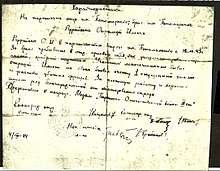Oswald Rufeisen
Shmuel Oswald Rufeisen (1922–1998), better known as Brother (or Father) Daniel, O.C.D., was a Polish-born Jew who survived the Nazi invasion of his homeland, in the course of which he converted to Christianity, becoming a Catholic and a friar of the Discalced Carmelite Order. He moved to Israel, where he sought citizenship under the Israeli Law of Return, but was refused by the Israeli government.
Life
Rufeisen was born to a Jewish family in Zadziele[1] near the Polish town of Oświęcim (German: Auschwitz). During his youth, he belonged to Akiva, a religious Zionist youth movement. Hillel Zeidel, a Liberal Party Knesset member, who broke ranks and joined Menachem Begin’s Likud in 1977, was a childhood friend from the movement.
To escape Nazi persecution, Rufeisen was hidden in a convent of the Sisters of the Resurrection for over a year; during this time he decided to convert to Catholicism. He helped to save hundreds of Jews in the town of Mir, Belarus from deportation to concentration camps. In 1945, after the war, he returned to Poland, converted, and became a Discalced Carmelite friar, and eventually a Catholic priest.

In the 1950s, under pressure from a wave of antisemitism by the Polish communist government, Rufeisen applied for Israeli citizenship under the Law of Return, which provides Jews with Israeli citizenship through a streamlined process (e.g. without the requirement of several years residency). He claimed that although he was not a religiously observant Jew, his Jewish ancestry and cultural identity was a significant aspect of his overall personhood, and he was still considered Jewish by some branches of Judaism (Orthodox and Conservative Judaism), but not others (Reform Judaism).
The Israeli government denied Rufeisen's request, on the grounds that he had converted to Christianity. Rufeisen appealed the case to the Supreme Court of Israel, and in 1962 the Court upheld the government's decision: any Jew converting to another religion would lose their preferential access to Israeli citizenship (Rufeisen v Minister of the Interior, (1962) 16 PD 2428).
Nevertheless, Rufeisen was able to immigrate to Israel, acquired Israeli citizenship through naturalization, and lived the rest of his life at the Stella Maris Carmelite Monastery in Haifa.
In literature
The novel Daniel Stein, Interpreter by renowned Russian writer Lyudmila Ulitskaya was inspired by the life of Oswald Rufeisen.[2]
References
- Cholawski, Shalom, Oswald Rufajzen in Encyclopaedia of the Holocaust vol. 3, p. 1311.
- Tec, Nechama (2008). In the Lion's Den: The Life of Oswald Rufeisen. Oxford University Press. ISBN 978-0-19-538347-8.
Notes
- ↑ Ghetto Fighters' House Archives
- ↑ Interview at 'MAN Booker International Prize', NDR Kultur, 26 May 2009: "The Russian author Ulitzkaja speaking about her newest book described 'Daniel Stein' as a literature character but at the same time as an historical one: << The real Brother Daniel, whose civil name was Oswald Rufeisen, and my character Daniel Stein are not identical. The biography of my character is however almost identical to the real person. For me it was more important to follow the truthfulness of the literature narration rather than the historical truth>>."
External links
- Biography of Brother Daniel on the site of the Hebrew Speaking Catholics in Israel
- The strange case of 'Brother Daniel'
- Aharon Lichtenstein Brother Daniel and the Jewish Fraternity